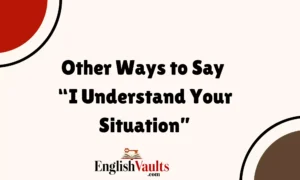In professional communication, especially in emails, clarity and politeness are paramount. The phrase “bring to your attention” is commonly used to highlight important matters or updates. However, over time, using the same expression can make your writing sound repetitive or unoriginal. Therefore, expanding your vocabulary and exploring different ways to convey the same message can enhance your communication skills and demonstrate your professionalism. In this article, we will explore 20 alternatives to “bring to your attention,” providing examples and scenarios that can help you express your thoughts more effectively. Each alternative will be accompanied by a practical email sample, ensuring that you can apply these phrases in your day-to-day communications.
20 Ways to Say “Bring to Your Attention” (With Samples)
- 1. I Would Like to Highlight
- 2. I Want to Draw Your Attention To
- 3. I Wish to Inform You
- 4. I Would Like to Point Out
- 5. I Want to Bring to Your Notice
- 6. I Would Like to Draw Your Focus To
- 7. I Would Like to Make You Aware
- 8. I Wish to Bring to Your Attention
- 9. I Want to Notify You
- 10. I’d Like to Share
- 11. I Want to Remind You
- 12. I Would Like to Inform You
- 13. I’d Like to Bring Up
- 14. I Want to Call Your Attention To
- 15. I Wish to Highlight
- 16. I’d Like to Remind You
- 17. I Want to Inform You
- 18. I Wish to Update You
- 19. I Would Like to Alert You To
- 20. I Want to Update You On
1. I would like to highlight
In professional correspondence, the phrase “I would like to highlight” serves as a courteous way to draw someone’s focus to a particular issue. It signals to the recipient that the following information is significant.
Email Example:
Subject: Project Deadline Reminder
Dear Tomi,
I hope this message finds you well. I would like to highlight the upcoming deadline for the marketing project we discussed last month. The final deliverables are due on October 15. Please ensure that all tasks are completed by then to avoid any last-minute rush.
If you need assistance or have any questions, feel free to reach out. Your hard work is appreciated!
Best, Jerry
Addition:
Using “I would like to highlight” can create a positive tone and demonstrate respect for the recipient’s attention.
2. I want to bring to your notice
This phrase is direct and implies urgency without being too harsh. It’s suitable for situations that require immediate attention.
Email Example:
Subject: Urgent: Client Feedback Needed
Hi Tomi,
I want to bring to your notice the feedback we received from our client regarding the latest design draft. They have expressed a need for some changes, particularly in the color scheme and layout.
It would be great if we could address this by the end of the week so we can stay on track for the presentation next Monday. Let me know your thoughts!
Best regards, Jerry
Addition:
This phrase can emphasize the importance of the matter at hand, prompting a quicker response.
3. I would like to draw your attention to
This phrase is slightly more formal and works well in professional contexts where you need to be polite yet assertive.
Email Example:
Subject: New Policy Implementation
Dear Tomi,
I hope you are having a productive week. I would like to draw your attention to the new policy that will take effect next month regarding remote work. It outlines the expectations and responsibilities of all employees.
Please review the document attached and let me know if you have any questions. We all must adhere to these guidelines to ensure a smooth transition.
Thank you, Jerry
Addition:
Using “I would like to draw your attention to” indicates a formal context, making it suitable for corporate communications.
4. I wish to inform you
A straightforward phrase that conveys a sense of authority, “I wish to inform you” is effective when delivering critical information.
Email Example:
Subject: Meeting Rescheduled
Hi Tomi,
I hope you are doing well. I wish to inform you that our weekly team meeting has been rescheduled to Thursday at 3 PM instead of the usual time.
Please mark your calendar accordingly. Let me know if you will be able to attend.
Best, Jerry
Addition:
This phrase can project confidence and clarity in your communication.
5. I’d like to make you aware
This phrase is approachable and friendly, making it suitable for less formal communications.
Email Example:
Subject: Upcoming Training Session
Dear Tomi,
I hope this email finds you well. I’d like to make you aware of an upcoming training session on October 5 that will cover new software features we’ll be implementing next month.
It’s a great opportunity to get acquainted with the changes and ask any questions. Please let me know if you would like to attend.
Cheers, Jerry
Addition:
“I’d like to make you aware” promotes a collaborative environment, inviting the recipient to engage.
6. I want to point out
This phrase is casual yet effective, suitable for emails where you want to maintain a friendly tone while still being assertive.
Email Example:
Subject: Sales Performance Update
Hi Tomi,
I wanted to point out that our sales figures for this quarter have exceeded our expectations! This is a fantastic achievement for the whole team.
Let’s discuss this in our next meeting and explore how we can build on this success.
Best, Jerry
Addition:
Using “I want to point out” conveys enthusiasm and positivity, which can inspire your team.
7. I’d like to draw your attention
This variation keeps the formality while subtly changing the wording to keep it fresh.
Email Example:
Subject: Feedback Needed on Proposal
Dear Tomi,
I’d like to draw your attention to the proposal I submitted last week. Your feedback is essential for making the necessary adjustments before our client meeting.
Please let me know if you need any additional information to facilitate your review.
Thanks, Jerry
Addition:
This phrase maintains a polite tone while encouraging prompt feedback.
8. I want to notify you
This phrase carries a straightforward and no-nonsense tone, suitable for more formal communication.
Email Example:
Subject: Security Protocol Update
Hi Tomi,
I want to notify you of the recent changes to our security protocols that will be implemented starting next week. Please familiarize yourself with the updates to ensure compliance.
Feel free to reach out if you have any questions.
Regards, Jerry
Addition:
Using “I want to notify you” establishes seriousness about the information being conveyed.
9. Please be advised
This phrase is formal and often used in legal or official communications.
Email Example:
Subject: Change in Operating Hours
Dear Tomi,
Please be advised that our office hours will change starting next month. The new hours will be from 9 AM to 6 PM instead of 8 AM to 5 PM.
If you have any concerns regarding this change, please let me know.
Sincerely, Jerry
Addition:
This phrase adds a layer of professionalism, especially in formal contexts.
10. I’d like to alert you
A phrase that indicates urgency, “I’d like to alert you” is useful for matters that need immediate attention.
Email Example:
Subject: System Maintenance Notification
Hi Tomi,
I’d like to alert you that the IT department will conduct scheduled maintenance on our systems this weekend. This will result in temporary downtime from Saturday at 10 PM to Sunday at 6 AM.
Please plan accordingly and let your teams know.
Best, Jerry
Addition:
Using “I’d like to alert you” shows that you take the recipient’s time and responsibilities seriously.
11. I wish to draw your attention to
This is a more formal way of saying you want to highlight something important, often used in written reports.
Email Example:
Subject: Budget Review Meeting
Dear Tomi,
I wish to draw your attention to the upcoming budget review meeting scheduled for October 12. We all must come prepared to discuss our departmental needs and priorities.
Please confirm your attendance at your earliest convenience.
Best regards, Jerry
Addition:
This phrase is effective in formal documentation and meetings, as it underscores the importance of the subject matter.
12. I want to emphasize
When you need to stress the significance of a message, this phrase works well.
Email Example:
Subject: Customer Satisfaction Survey Results
Hi Tomi,
I want to emphasize the results of our recent customer satisfaction survey. The feedback has highlighted key areas where we excel and where improvements are needed.
I believe it’s vital we address these points in our strategy moving forward. Let’s schedule some time to discuss this.
Thank you, Jerry
Addition:
Using “I want to emphasize” conveys importance and can motivate the recipient to take action.
13. I want to signal
This phrase conveys a sense of urgency while still being polite and professional.
Email Example:
Subject: Team Performance Review
Dear Tomi,
I want to signal that our team performance review is approaching quickly. Please ensure that all necessary evaluations are submitted by October 1.
Your cooperation is greatly appreciated.
Best, Jerry
Addition:
Using “I want to signal” can help communicate urgency without sounding aggressive.
14. I’d like to remind you
This phrase is polite and works well for follow-ups, ensuring the recipient remembers something important.
Email Example:
Subject: Deadline Reminder for Report Submission
Hi Tomi,
I’d like to remind you that the deadline for submitting the quarterly report is next Friday. Please ensure that all sections are completed and submitted by then.
Let me know if you need any assistance!
Cheers, Jerry
Addition:
This phrase fosters accountability and reinforces deadlines in a friendly manner.
15. I would like to inform you
A formal and polite way to communicate essential updates or information.
Email Example:
Subject: Annual Leave Policy Update
Dear Tomi,
I would like to inform you about the changes to our annual leave policy. Effective next month, employees will be eligible for an additional five days of leave.
Please review the attached document for full details.
Best regards, Jerry
Addition:
Using “I would like to inform you” conveys authority and respect, appropriate for HR-related communication.
16. I want to present
This phrase is effective when sharing information that requires attention and consideration.
Email Example:
Subject: New Project Proposal
Hi Tomi,
I want to present the new project proposal I have been working on. It outlines potential strategies for increasing our market share.
I’d love to schedule a time to discuss it further and gather your insights.
Thank you, Jerry
Addition:
Using “I want to present” can create anticipation and interest in the information you’re sharing.
17. I wish to update you
A great phrase for conveying ongoing information or changes.
Email Example:
Subject: Staffing Changes
Dear Tomi,
I wish to update you regarding recent staffing changes within our team. We have welcomed two new members who will be starting next week.
Let’s discuss how we can integrate them into ongoing projects.
Best, Jerry
Addition:
This phrase emphasizes transparency and keeps everyone in the loop regarding team changes.
18. I’d like to make you aware of
A casual yet professional way to inform someone of something important.
Email Example:
Subject: Networking Event Invitation
Hi Tomi,
I’d like to make you aware of an upcoming networking event for professionals in our industry. It will take place on October 20, and it’s a great opportunity to meet potential clients.
Let me know if you’d like to attend together!
Best, Jerry
Addition:
This phrase invites collaboration and encourages team bonding.
19. I’d like to share
An informal yet effective way to share important information.
Email Example:
Subject: Industry Trends Report
Hi Tomi,
I’d like to share the latest industry trends report with you. It contains valuable insights that could influence our strategy for the upcoming quarter.
I look forward to hearing your thoughts!
Best, Jerry
Addition:
This phrase fosters collaboration and openness in communication.
20. I would like to express
This phrase is useful when conveying your thoughts or feelings about a matter.
Email Example:
Subject: Gratitude for Team Efforts
Dear Tomi,
I would like to express my gratitude for your hard work on the recent project. Your dedication and creativity truly made a difference, and I appreciate all that you do.
Let’s continue this momentum in our future projects!
Warm regards, Jerry
Addition:
Using “I would like to express” adds a personal touch and can strengthen workplace relationships.
Conclusion
Expanding your vocabulary and finding different ways to convey the message of “bringing to attention” not only enhances your communication skills but also adds variety to your professional emails. By using the alternatives provided in this article, you can ensure that your messages remain fresh and engaging. Experiment with these phrases to see which ones resonate best in different contexts, and always aim for clarity and professionalism in your communications.










